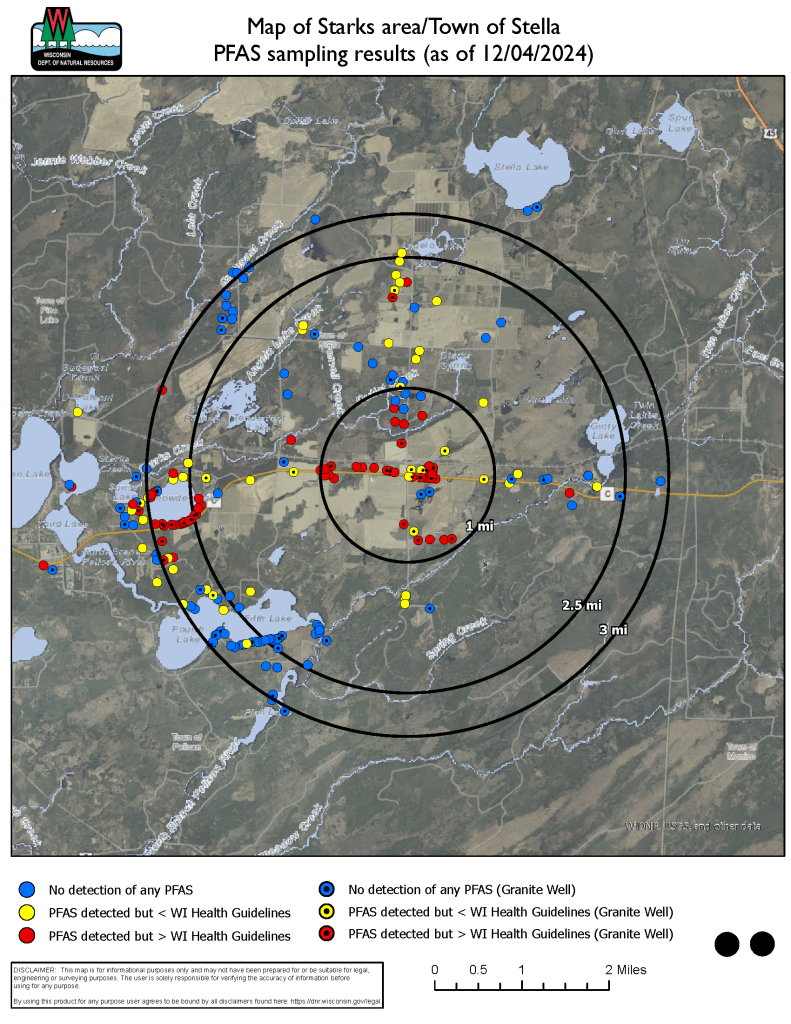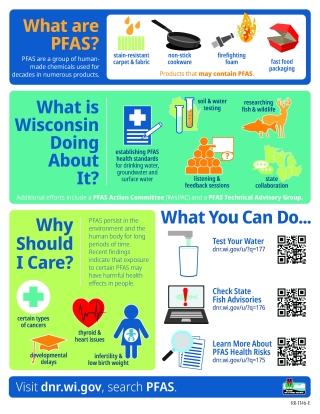PFAS Contamination in the Town of Stella
PFAS contamination has been detected in the Town of Stella in Oneida County in private drinking water and groundwater. In addition to the information on this website, the Town of Stella has a website dedicated to providing information to the public.
SUBSCRIBE to updates about PFAS contamination in the Town of Stella.
SUBMIT a question, comment or concern about PFAS in the Town of Stella.
FIND a certified lab that can test drinking water for PFAS.
SEARCH a database for sites with reported PFAS contamination.
Public Meetings
Questions about PFAS contamination in the Town of Stella may be submitted by email to DNRStellaPFAS@wisconsin.gov or by calling 1-888-626-0605.
Information about upcoming meetings will be posted here when available.
Public Meeting Date Time Location Information Oneida County Public Health Meeting - DNR Guest Speaker May 1, 2024 5:30 p.m. James Williams Middle School
915 Acacia Ln.
Rhinelander, WI 54501Town Meeting Aug. 15, 2023 5-6 p.m. Town of Stella Town Hall
2496 CTH C
Rhinelander, WI 54501Town Meeting Jan. 19, 2023 5-6:30 p.m. Town of Stella Town Hall
2496 CTH C
Rhinelander, WI 54501Agenda Town Board Meeting Dec. 13, 2022 5 p.m. Town of Stella Town Hall
2496 CTH C
Rhinelander, WI 54501Private Well Sampling
Private Well Sampling Update
In the spring of 2024, the DNR expanded its private well sampling efforts in the Town of Stella to include additional private wells. Cost-free sampling is now available for all private drinking water wells within 3 miles of the Town of Stella Town Hall, including both seasonal and year-round wells. Eligible well owners in this area will be sent a letter with more information about how to sample their well for PFAS. Letters will be sent in batches to account for the laboratory's capacity to analyze samples. It is anticipated all eligible well owners will receive a letter by June 30, 2024.
Private Well Sampling
The DNR initiated private well sampling for PFAS after analytical results from a private well in the Town of Stella exceeded the Department of Health Services' (DHS) recommended health guidelines.
This private well was sampled for PFAS as part of a statewide study to determine PFAS prevalence in groundwater throughout Wisconsin. Since the initial sampling took place in July 2022, the DNR has offered cost-free PFAS sampling to all residences within 3 miles of the Town of Stella Town Hall. Additionally, the DNR offered private well sampling to a small subset of residents near Sunset Lake. This area was selected for private well sampling because of PFAS levels found in a water sample collected from the area in May 2024. Residences that are eligible to have the DNR pay for PFAS sampling costs will receive a letter with more information about how to sample their well.
As of Dec. 4, 2024, the DNR has received PFAS results for 225 private wells in the vicinity of the Town of Stella. Of the 225 wells sampled for PFAS:
- 71 private wells have reported concentrations of PFAS greater than DHS' recommended health guidelines.
- 54 private wells have reported detections for PFAS but are less than DHS' recommended health guidelines.
- 100 private wells have no reported detections for PFAS.
Below is a map of PFAS sampling results for private wells in the Town of Stella/Starks.
- Red circles indicate private well sampling results with PFAS concentrations above DHS' recommended health guidelines.
- Yellow circles indicate private well sampling results where PFAS was detected, but concentrations are below DHS' recommended health guidelines.
- Blue circles indicate private well sampling results with no detected PFAS.
- Circles with a black dot in the center indicate wells known to be drilled into granite bedrock.
- Circles outside the 3-mile sampling area, except in the immediate vicinity of Sunset Lake, were submitted to the DNR by private well owners that sampled their well for PFAS.
Homeowners with PFAS levels in their private well above DHS' recommended health guidelines are eligible for in-home bottled water paid for by the DNR. The DNR will contact impacted homeowners to start the process of requesting temporary emergency water.
Questions can be directed to DNRStellaPFAS@wisconsin.gov or 1-888-626-0605.
Well Compensation Grant Program
The DNR will provide well owners in the Town of Stella with recommendations for a long-term solution that could potentially include replacing the well, installing treatment on the existing well or connecting to a known safe water source. Financial assistance may be available to private well owners through the Well Compensation Grant Program.
Please Note: Work completed before applying for a grant and receiving DNR approval will not be reimbursed.
Alternative Drinking Water
In September 2022, the Wisconsin Department of Health Services (DHS) began issuing drinking water advisories to residences in the Town of Stella with PFAS levels above DHS' recommended enforcement standards or the cumulative risk hazard index.
The DNR can provide temporary emergency water to residences that have received a well-specific drinking water advisory from DHS. Temporary emergency water is delivered to affected residences in 5-gallon jugs.
Residents who choose to receive temporary emergency water from the DNR need to complete an Agreement for Requesting Temporary Emergency Water. Paper copies of this agreement are available at the Town of Stella Town Hall. The completed agreement can be emailed to DNRStellaPFAS@wisconsin.gov, submitted to the DNR's Rhinelander Service Center or mailed to:
Wisconsin Department of Natural Resources
Gwen Saliares
625 East County Road Y, STE. 700
Oshkosh, WI 54901Those who are unable to lift 5-gallon jugs should indicate on the agreement that they need a bottom-loading dispenser.
Empty jugs will be exchanged for full jugs at the next delivery and should not be discarded or recycled.
Investigations
Background
In the summer of 2022, the DNR's Bureau of Drinking Water and Groundwater launched a project designed to understand PFAS occurrence in Wisconsin's shallow groundwater by sampling 450 wells throughout the state. Wells were selected using a process designed to obtain an even geographic distribution of wells throughout the state. The project relied on the voluntary participation of the well owners, and the DNR paid for costs to analyze the water samples.
PFAS Sampling in Private Wells
During this study, sample results from a private well in the Town of Stella, Oneida County, indicated high levels of PFAS compounds in the water. Because of this result, the DNR, in consultation with the Department of Health Services (DHS), offered free PFAS sampling to nearby private well owners. This additional sampling provided the DNR with more information to understand the extent of contamination in the area and private well owners with information about the concentrations of PFAS compounds in their drinking water. This additional sampling found other drinking water wells with high levels of PFAS contamination.
Surface Water and Fish Sampling
In the summer of 2023, the DNR's Water Quality program sampled surface water sites near the towns of Starks and Stella, including the Moen Lake Chain, the north branch of the Pelican River and the Wisconsin River near Rhinelander, for PFAS.
Sampling results found that several water bodies contained levels of PFOA and PFOS, two types of PFAS compounds, higher than Wisconsin's water quality standards. Water bodies with high PFOA and PFOS include Snowden Lake, Starks Creek, several lakes in the Moen Lake Chain (i.e., Second, Third, Fourth and Fifth lakes), Twin Lakes Creek, the Pelican River and the north branch of the Pelican River. This document provides a map of locations where water samples were collected and detailed sampling results for those locations. These results are also available on the PFAS Interactive Data Viewer.
Fish samples were also collected from Fifth Lake in the Moen Lake Chain. Based on the results, the DNR encourages everyone to follow fish consumption recommendations for the Moen Lake Chain. The results of these sampling efforts will be used to plan for additional sampling for PFAS in surface water and fish tissue.
Further investigation would be needed to determine PFAS sources in the area. However, the DNR is working closely with partners at the DHS and Oneida County Health Department to evaluate probable contaminant sources and communicate health risks to the public. More information on how best to protect people and pets from potential PFAS exposure is available on the DHS website.
Deer Tissue Sampling
The Wildlife Management program is working to understand if PFAS are accumulating in white-tailed deer near the Town of Stella. The DNR is accepting deer tissue samples, including muscle and liver, from deer harvested within 3 miles of the Town of Stella during all 2024 deer hunting seasons. These samples will be analyzed for PFAS, and the results will be shared with the DHS to determine whether any consumption advisories are warranted.
Wastewater and Residual Solids
On July 25, 2023, the DNR sampled the residual solids removed during the wastewater treatment processes at the Ahlstrom Munksjo paper mill in Rhinelander. Sample results are presented in nanograms per gram (ng/g) or parts per billion. The mill historically landspread these solids on agricultural fields in the Town of Stella area since the 1980s or possibly earlier. The above results are indicative of current conditions and may not reflect past concentrations or loadings from the facility.
The DNR's interim strategy for the management of PFAS-impacted wastewater residuals provides more information about landspreading of residual solids.
Additional Information
Additional information about the DNR’s work to understand and address PFAS in the Town of Stella is available on the Bureau of Remediation and Redevelopment Tracking System (BRRTs).
Health Information and Resources
The Wisconsin Department of Health Services (DHS) is supporting the DNR in assessing human health risks associated with PFAS contamination in the Town of Stella, Oneida County, including providing recommendations to reduce those risks.
DHS has worked with the DNR to issue well-specific health advice for residents in this area. When levels of PFAS are above DHS' recommended groundwater standards, DHS has issued health advisories informing residents that they should use an alternative source of water for drinking and preparing foods that take up a lot of water (e.g., oatmeal, jello and rice).
For health-related questions, please email DHS at DHSEnvHealth@dhs.wisconsin.gov.
Learn more about the health effects of various PFAS on the following websites.
- DHS: Per- and Polyfluroalkyl Substances (PFAS)
- DHS: PFAS Contamination In and Around the Town of Stella: Health Information
- Agency for Toxic Substances and Disease Registry (ATSDR): PFAS And Your Health
Federal Coordination
The DNR is coordinating with the U.S. Environmental Protection Agency (EPA) on potential options to address PFAS contamination in the Town of Stella. Current coordination efforts include sharing sampling results for private wells, surface waters and other media, as well as information about historical land use in the area. With this information, the DNR and EPA will continue to collaborate on the next steps and to identify potential resources the community and state may be able to access to address the contamination.


